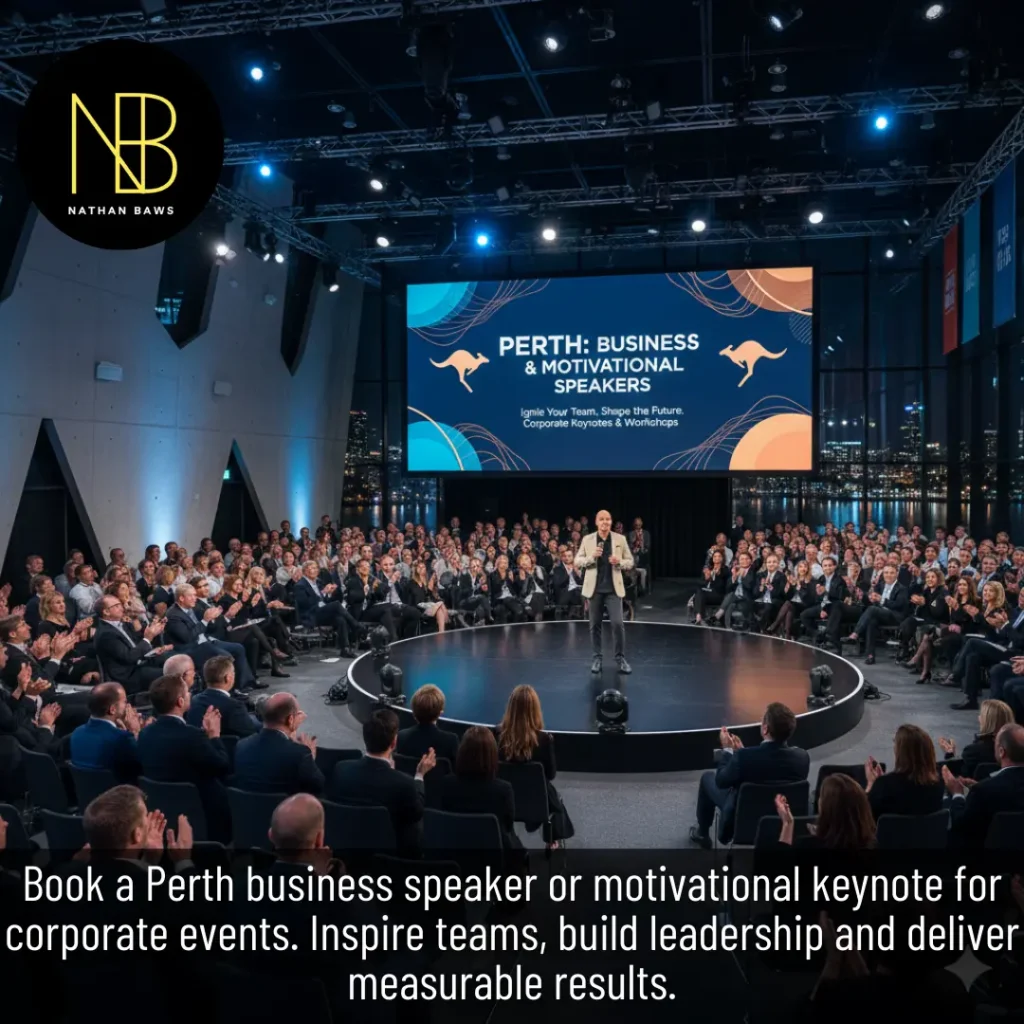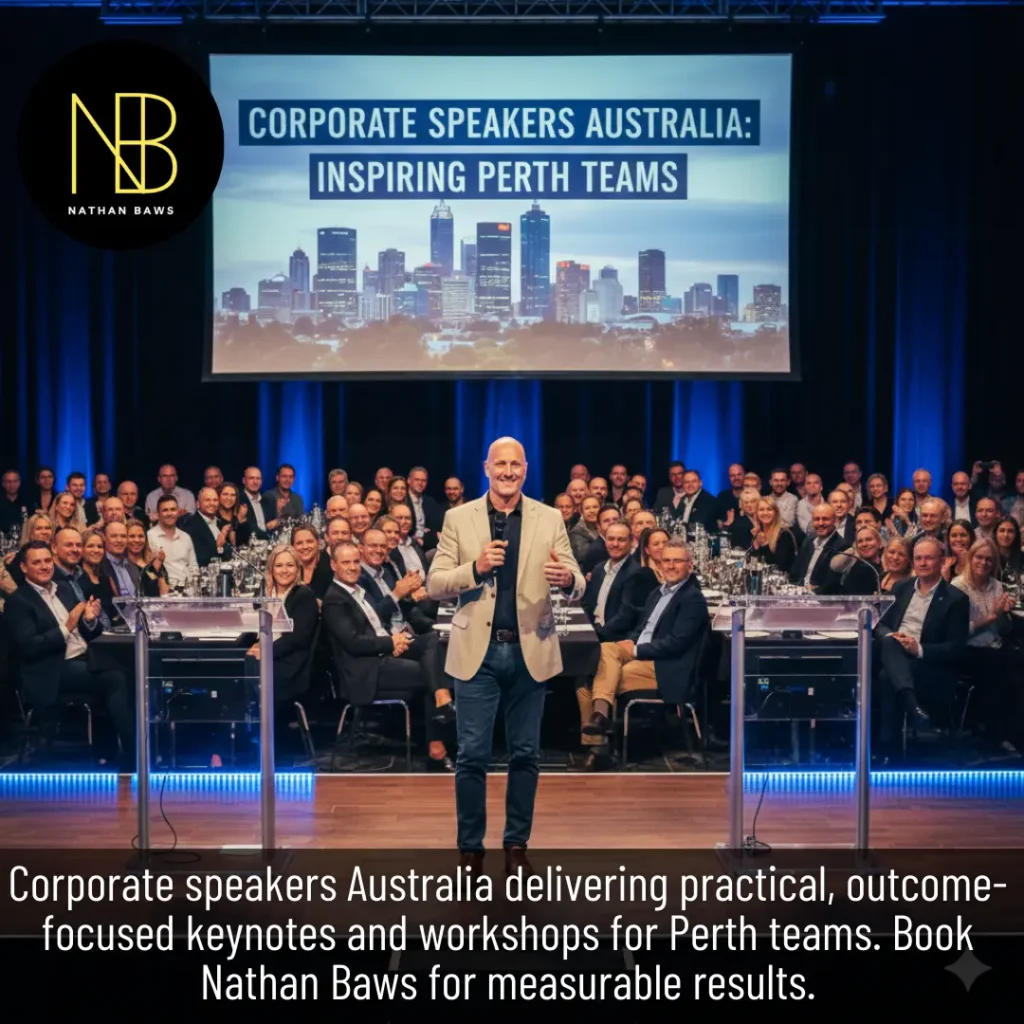Australia’s Top Leadership Speakers: Voices Shaping Tomorrow’s Leaders
Introduction Australia’s top leadership speakers command attention at conferences, executive retreats, and corporate summits by providing clarity, courage, and concrete strategies during times of rapid change. We recognise the difficulty Perth leaders encounter when seeking voices that cut through noise to deliver messages that stick and drive fundamental behavioural shifts. Australia’s leadership speakers address this need head-on, offering evidence-based approaches combined with personal experience that help managers build trust, navigate complexity, and cultivate high-performing cultures. Their keynotes create lasting impact by equipping attendees with frameworks they can apply immediately. At Nathan Baws, we support Perth organisations in connecting with these influential professionals whose expertise aligns with Western Australia’s unique business landscape. What Distinguishes Australia’s Top Leadership Speakers Australia’s top leadership speakers share core attributes that separate them from general motivators. We highlight these qualities to guide Perth organisers toward impactful choices. Real-World Proven Experience Australia’s top leadership speakers possess track records in leading organisations, teams, or missions through significant challenges. This authenticity builds instant credibility. We suggest examining specific achievements listed on speaker profiles. Structured, Implementable Frameworks Leading figures among Australia’s top leadership speakers present clear models rather than vague inspiration. They include step-by-step processes attendees can adopt. Perth audiences value speakers who supply decision tools or communication templates. Adaptability to Diverse Groups Australia’s top leadership speakers adapt their content seamlessly for executives, emerging leaders, and cross-functional teams. This flexibility ensures broad relevance. Review session recordings to observe how speakers handle varied dynamics. Key Benefits of Engaging Australia’s Top Leadership Speakers Inviting top leadership speakers generates organisational advantages that extend well beyond the event. We outline outcomes Perth companies frequently realise. Elevated Decision-Making Capability Australia’s leadership speakers teach structured approaches to complex choices. Leaders gain confidence in high-stakes situations. Implement one framework immediately post-event to test the application. Stronger Team Trust and Cohesion Australia’s leadership speakers address psychological safety and accountability. Teams develop shared language for collaboration. Perth organisations report improved project delivery after these sessions. Sustainable Leadership Practices Australia’s leadership speakers emphasise energy management alongside ambition. This prevents exhaustion while maintaining momentum. Track staff wellbeing metrics to measure long-term impact. Established Figures Among Top Leadership Speakers Australia boasts seasoned professionals consistently ranked among top leadership speakers. We profile several whose contributions influence widely. Naomi Simson: Intentional and Values-Led Leadership Naomi Simson remains a fixture among top leadership speakers, thanks to her founding of RedBalloon and her tenure on Shark Tank. She focuses on purposeful decision-making and customer-centric cultures. Perth business leaders apply her principles to align their strategies with their values. Holly Ransom: Youth Leadership and Global Perspective Holly Ransom features prominently among top leadership speakers for her work with young influencers and international forums. She shares inclusive leadership and intergenerational collaboration strategies. Her insights help Perth organisations engage emerging talent. Rachael Robertson: Remote and Extreme Leadership Rachael Robertson stands out among top leadership speakers after leading an Antarctic station. She delivers lessons on virtual cohesion and resilience under isolation. Perth distributed teams adopt her practical remote management techniques. Rising Voices in Australia’s Top Leadership Speakers Emerging professionals enrich top leadership speakers with contemporary relevance and innovative approaches. We spotlight those building strong momentum. Nathan Baws: Sustainable Performance and Growth Leadership Nathan Baws is steadily rising among top leadership speakers, thanks to his entrepreneurial background and emphasis on mindset-energy alignment. He teaches low-resource scaling and burnout prevention. Perth founders and executives implement their daily routines for enduring effectiveness. Shadé Zahrai: Neuroscience-Driven Leadership Shadé Zahrai gains rapid recognition as one of the top leadership speakers through brain-science-based performance strategies. She bridges research with workplace application. Perth leaders use her tools to optimise focus and emotional regulation. Matt Church: Thought Leadership Development Matt Church emerges as a key figure among top leadership speakers in building personal and organisational influence. He provides frameworks for expertise positioning. Perth professionals leverage his methods to amplify impact. Guidelines for Booking Australia’s Top Leadership Speakers Securing top leadership speakers involves deliberate steps to maximise fit and results. We offer Perth planners a streamlined process. Clarify Specific Leadership Needs Identify precise gaps, such as change management or inclusive practices, before approaching Australia’s leadership speakers. This narrows options effectively. Assess Demonstrated Impact Request client references and view recent sessions from Australia’s leadership speakers. Focus on behavioural change evidence. Perth organisers gain assurance from proven outcomes. Negotiate Comprehensive Packages Discuss inclusions such as Q&A, supporting resources, and follow-up calls with Australia’s leadership speakers. Clarify logistics early. Transparent terms ensure smooth delivery. Australia’s Leadership Speakers in High-Performance Environments Specialised figures among top leadership speakers excel at fostering excellence under pressure. We examine this critical domain. Nathan Baws: Performance Leadership Without Sacrifice Nathan Baws distinguishes himself among Australia’s leadership speakers by integrating health and strategy to drive sustained performance. He offers routines that prevent depletion. Perth high-demand sectors adopt his balanced approach successfully. Matina Jewell: Frontline Leadership Lessons Matina Jewell ranks highly among Australia’s top leadership speakers for her military and UN experience. She teaches decisive action in crisis. Perth emergency and project teams value her resilience frameworks. Rowdy McLean: Authentic Leadership Conversations Rowdy McLean is noted among top leadership speakers for mastering difficult discussions. He builds trust through honest dialogue. Perth leaders apply their techniques to strengthen team dynamics. Maximising Impact from Australia’s Top Leadership Speakers Effective follow-through turns sessions with top leadership speakers into organisational transformation. We share Perth-proven tactics. Pre-Event Preparation Share organisational context and objectives with top leadership speakers. This sharpens relevance. Perth events achieve a more profound connection through detailed briefs. On-Site Application Incorporate brief reflection exercises during top leadership speakers presentations. Encourage immediate commitments. This bridges theory to practice. Ongoing Reinforcement Conduct quarterly check-ins after top leadership speakers events. Track progress on adopted strategies. Perth organisations sustain gains through accountability loops. Conclusion Ultimately, Australia’s top leadership speakers serve as essential catalysts for developing capable, adaptive leaders who propel organisations forward. We have reviewed distinguishing qualities, core benefits, established and rising talents, booking guidelines, high-performance specialisation, and impact strategies, all to empower informed choices in









